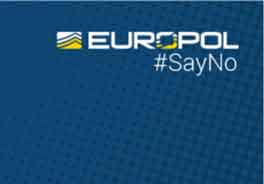Police across Europe issue warning about the online coercion and extortion of children

Often referred to as ‘sextortion’ or ‘webcam blackmailing’, the online coercion and extortion of children – a form of digital blackmail where sexual information or images are used to extort sexual material, sexual favours or money, has skyrocketed in the past years, but remains largely underreported.
How the crime works
In a report released today by Europol, it is revealed that victims as young as 7 years old are being targeted online.
When targeting a minor, offenders have two main motivations:
- A sexual interest in children, where the objective of the extortive exchange is the procurement of sexual material (photos and/or videos depicting the child) or a sexual encounter offline
- An economic interest, where the objective is to gain financially from the extortion
Based upon information collected by the US National Centre for Missing and Exploited Children’s CyberTipline, Europol’s report reveals that female child victims are being blackmailed more significantly for sexually explicit material (84%) compared to their male counterparts (53%). The latter are more so targeted for financial gain (32% compared to 2% for female child victims), a relatively new trend in the field of online child sexual abuse. Another such trend is the perpetrator’s demand for the targeted child to include other children, such as siblings or peers, in the images/videos. In such cases, even those children who use safe practices in the online environment or younger children who may not use the Internet yet can be targeted this way.
The personal and psychological toll on the victims of this crime is not to be underestimated: a number of children have reportedly committed suicide in the last few years after falling victim to this crime. Many acts of online coercion and extortion of children go unreported as a result of the embarrassment regarding the material provided to the perpetrator or lack of awareness by victims that they have been subject to a criminal offense.
‘Say No’ awareness raising campaign
In response to this worrying phenomenon, the European law enforcement community has joined forces with partners from the private sector to launch a campaign, #Say NO”, supported by Europol, to give advice to those who have been, or are likely to be targeted, and to strengthen reporting and support mechanisms.
The campaign includes a short film, available in all EU languages, which helps people to recognise a potential sextortion approach, provides online advice and highlights the importance of reporting the crime to the competent national authorities.
Steven Wilson, Head of Europol’s European Cybercrime Centre, said:
“Children are increasingly using the online environment to communicate and form relationships and this should be considered as a natural part of their development. However it is our collective responsibility to educate them on the threats they may experience and also protect them to make the online environment as safe as possible. Where something untoward happens online we should provide clear and effective reporting and support mechanisms so they understand where to turn to for assistance.”
Are you a victim? Get help. Report it. We are here.
Europol’s message to those who are targeted is don’t pay and don’t feel embarrassed to report it to the police. If someone threatens you with sharing sexual photos or videos of you unless you send them more or pay them money, follow these steps:
- Don’t share more, don’t pay anything.
- Look for help. You are not alone.
- Preserve evidence. Don’t delete anything.
- Stop the communication. Block the person.
- Report it to the police.
Assistant Chief Constable Jon Drake said
“If you have been a victim of this crime you do not need to feel embarrassed or alone. The individuals that have targeted you are highly skilled and manipulative.
“Please report it to the police. Keeping you safe is our priority and we will work with partner agencies to bring perpetrators of online coercion and extortion to justice.”
For more advice on how to react if you, your child or a young person discloses that they have potentially a victim of online sexual coercion and extortion, please visit Europol’s dedicated webpage.

